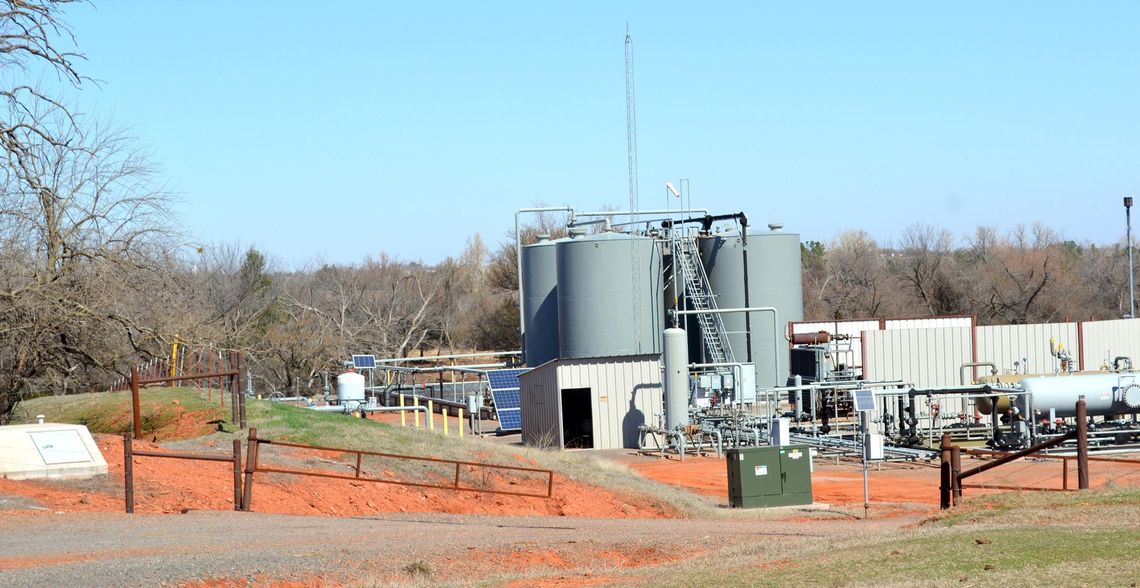City working to create environment where residents, oil and gas companies can co-exist
Driving through Newcastle from Main Street west on State Highway 130, just past the Rockwell intersection, is the Spitfire 08171H oil and gas site. It’s relatively quiet with a car driving by every so often, and the trees have yet to bloom. Approximately 150 yards to the north a compressor hums in the distance.
It is sites like these that were the topic of a special meeting of the Newcastle City Council on February 27. Council members met specifically to address issues involving the oil and gas industry and the protection of area residents and their rights. The meeting resulted in no decisions or changes being made, but more study is being done and another Council meeting on the topic will be scheduled at a later date.
During the meeting, the Council and representatives from oil and gas companies made it clear that more study, specifically on how the City handles noise emanating from the well sites, would need to be done and professionals in the field would likely need to be engaged.
The thought is that experts would probably be able to provide guidance to the Council with setting noise levels and what is considered a nuisance.
Newcastle Mayor Karl Nail said he believes Newcastle’s ordinances governing oil and gas in the city limits is in line with other municipalities, but he would like to get an expert from the industry and determine what the City can do.
Nail said, “We need information from experts. What is reasonable? We have to look at this unless we want to fight it out in court.”
Council members noted that the City is governed by a liberal interpretation of the State Legislature when it enacted the latest state statute, which says when working with the oil and gas industry, municipalities must have a reasonableness to what they are doing.
“If we enact something that is not realistic, we will be challenged,” Nail said, referring to court action by the oil and gas companies. “We must protect the citizens, but we can’t hinder the industry.”
There’s not an easy answer to what constitutes too much noise. Environmental factors such as proximity to other noise sources, time of day, and even weather will make a difference when attempting to get a baseline from which to operate.
Council members have gone to well sites and, in order to understand what the City is up against, measured the sound coming from well sites. But they say it’s no easy task without a baseline and specific guidelines.
A Conditional Use Permit issued July 9, 2018, by the City Council to EOG Resources, Inc. on the Spitfire, stipulated in its provisions that only 75 decibels maximum could come from the site at 300 feet from the sound source. This was with both temporary fencing at the site and with permanent fencing.
As a comparison, a decibel level chart from Yale University shows that normal conversation is between 60-70 decibels, and a vacuum cleaner is 75 decibels. It also shows that noise levels at 80-90 decibels are the “level at which sustained exposure may result in hearing loss.”
It further indicates that a suburban area at night is 40 decibels, and a business office is about 60-65 decibels.
The City has been working with attorney David Walls in drafting changes to the City’s ordinances. Their objective, according to Walls, is to make things clearer and have more organization, as well as place the burden of compliance on the people who are in the industry and best positioned to make those changes.
Walls said they were looking for a balance between what the oil and gas developers do that is important to the state and to the economy, but balance it with the needs of the citizens and the City.
They would like to be a standard-bearer for other cities with any ordinance that is eventually approved.
Walls said the ordinance would need to address two phases of the process: the drilling phase and then the completion and production phase. He said they have to be addressed independently.
He said, “We need to draw distinction between, and not be particularly burdensome, by setting limits and distance limits. Some of these were set out by ordinance already.”
Walls added that the City needs to have a process for citizens to go through when there is a concern with sound coming from a well site, and also a person who they can go to. Walls said this is a critical position.
Nail said the City would need to determine whether to have an oil and gas inspector, but he added that he doesn’t know that the City is in a position to hire someone for such a position at this time.
Meeting attendees from the oil and gas industry spoke to the Council, noting the problems they see with a proposed ordinance the City was studying. These included Jason Boykin and Todd Woolery from EOG Resources Inc., Scott Osborn and Jeff Clark from FourPoint Energy, and Andy Kapchinske and Chris Allen from Charter Oak Production.
A FourPoint Energy spokesperson said they were looking for clarity.
“We don’t want to be noisy neighbors, we just want it spelled out,” he said, adding that the City’s guidelines needed to be clearly stated, such as how is it measured, and is it appropriate for the circumstances?
Other topics the City will continue to address are traffic at well sites, and traffic created because of transporting items back and forth from well sites, 24-hour fracking, and information specific to disposal wells.
City Attorney Jeff Bryant said the City needs to “determine how to live together with an industry that is big in Oklahoma.”



